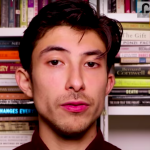EMERGENT CITY

(The 2024 Tribeca Film Festival runs June 5-16, and as always, we have many boots on the ground. Check out Chris Reed’s Emergent City movie review. Seen it? Join the conversation with HtN on our Letterboxd Page.)
All politics is local. Big issues in our world usually begin at the neighborhood level before spilling out to larger constituencies, though there is certainly reciprocity between macro and micro levels of cause and effect. In Emergent City, directors Kelly Anderson (My Brooklyn) and Jay Arthur Sterrenberg (editor, Dark Money) take a look at Sunset Park, a part of Brooklyn, NY, where corporate interests threaten to derail the lives of area residents.
At the heart of the conflict is Industry City, managed by the Jamestown investment group. Located on a site formerly used for manufacturing, with office spaces and commercial enterprises housed in repurposed warehouse buildings, it looks from the outside (and even on the inside) like a 21st-century designer’s dream. Instead of new construction on formerly pristine land, Industry City is taking under-utilized pre-existing structures and giving them new life while simultaneously offering business large and small a less expensive option than Manhattan. Who could possibly find anything wrong with this?
The inhabitants of Sunset Park, for one. A traditionally working-class district, with a large Latinx population, Sunset Park has a significant block of voters who see in developments like Industry City a threat to the remaining well-remunerated manufacturing jobs in the area. Service jobs pay much less, and the main problem with Industry City—which already exists, so that’s a moot issue—is that it functions as a kind of spearhead for future redevelopment. Jamestown has plans to build a hotel and bring other service-oriented jobs to the area, pushing out what remains of the older industries. First, however, they need to have the City Council approve a rezoning request. Neighborhood organizers have decided to fight back.
Urban renewal has long been a phrase laden with the long history of gentrification. And New York City has a documented past (as do most metropolises) of pushing out established communities to create seemingly more affordable housing for those who cannot afford the previously gentrified areas. For example, as stated early on in the film, young people moving to Brooklyn (because Manhattan is far too expensive), who can’t afford the (gentrified) Williamsburg or Park Slope, now look to Sunset Park. That’s great for them, but perhaps less so for those who currently live there.
The onscreen subjects who take cinematic pride of place are the members of UPROSE, “Brooklyn’s oldest Latino community-based organization” (as described on their website), who champion environmental justice and hope to see a different kind of redevelopment focused around green jobs. There is also Neighbors Helping Neighbors and the many others looking for alternatives to the Jamestown plan. City Council member (for New York’s 38th District) Carlos Menchaca is another protagonist (he no longer serves, having given up his seat to run for mayor in 2021), trying his best to square the circle of everyone’s competing needs. And then there is Industry City CEO Andrew Kimball.
The documentary does a terrific job showing the many ingredients that go into a working democracy. There’s shouting and distrust, but also many meetings to work things out. No group is a monolith, and the vibrancy of disagreement and occasional harmony has its fingerprints all over the narrative. Jamestown eventually pulls its rezoning plans, but who knows what may happen in the future. Another truism about politics is that nothing is eternal and people change their minds. In Emergent City, the locals may triumph for now, but there’s always tomorrow.
– Christopher Llewellyn Reed (@ChrisReedFilm)
2024 Tribeca Film Festival; Emergent City movie; Kelly Anderson, Jay Arthur Sterrenberg











